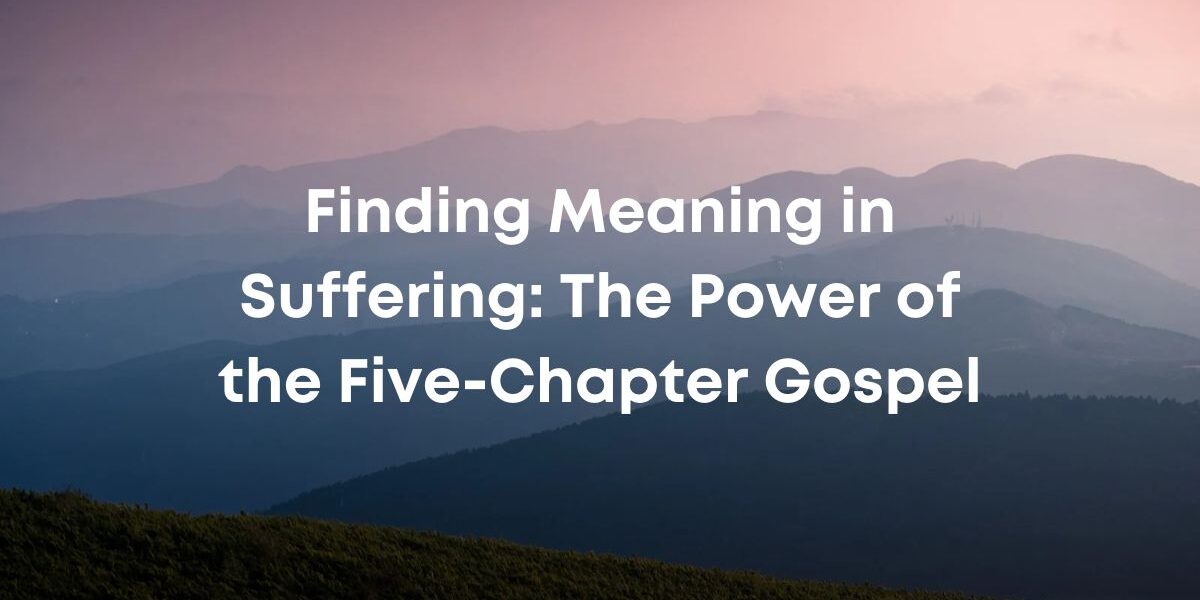Finding Meaning in Suffering: The Power of the Five-Chapter Gospel
Understanding Our Suffering through the Five-Chapter Gospel
Despite our best efforts and intentions, our lives are often filled with distortion, brokenness, and unexpected suffering. We grapple with challenging relationships, whether in our marriages or with our children, and at times, even our bodies seem to betray us. How can we navigate these trials and what do we make of persistent suffering?
The gospel of Jesus Christ offers not just a proclamation about a person, but is a power that is activated as we understand the entire story of the scripture. It gives context to our suffering. The entire biblical narrative, from Genesis to Revelation, reveals the story of King Jesus entering into this broken world, redeeming it, and making it his own. He walks with us through our suffering, having endured suffering himself because the joy set before him was us being renewed in the gospel. That was his joy set before his suffering on the cross. Why? Because one day he’s going to make the world the way it ought to be.
The Five-Chapter Gospel: A Comprehensive Perspective
The story of the Gospel is often truncated, leaving out many of its nuances. Some approaches portray only two chapters: the fall and redemption. This perspective, however, leaves us powerless in addressing the suffering and pain we encounter daily.
A more holistic perspective is the four-chapter Gospel: Creation, Fall, Redemption, and Restoration. This version affirms that the world was created good, acknowledging the entry of suffering through the Fall, the redemption offered by Jesus, and the final restoration of the heavens and earth. It beautifully explains concepts like marriage or work, as they relate to our relationships and purpose. But at times, the focus can become too heavily skewed towards heaven, making it challenging to relate our current stories within this narrative.
A five-chapter gospel, however, provides a broader perspective of wholeness and brokenness. In Creation, humanity was whole, sinless, and could commune directly with God. Then came the Fall, and sin and decay entered the world, causing creation itself to groan in anticipation of God restoring all things.
Redemption came next with Jesus offering salvation to all, and the Spirit helping us in our weakness. We now arrive at the Renewal chapter, where the Spirit works in and through us, transforming us into the image of Christ while we anticipate the final Restoration. This renewed understanding of the gospel brings powerful implications for our lives.
Objects and Agents of Renewal
Every follower of Jesus, in their current state, is both an object of renewal and an agent of renewal. As objects of renewal, Jesus prays for us, grants us spiritual blessings, and guides us through the Spirit. The Spirit bestows upon us faith, repentance, and joy, transforming us into the image of Christ and safeguarding our journey towards the new heavens and earth.
Simultaneously, in the midst of our turmoil and imperfection, we are agents of renewal. God uses us, in our brokenness, to effect change in the world. As we suffer, God’s grace not only brings us joy but also enables us to use our suffering to bless others and help them experience the power of His gospel.
Engaging the Five Chapters in our Lives
The five-chapter gospel provides a paradigm to examine all aspects of life. In the Creation chapter, we affirm and appreciate all that is good in our world. During the Fall chapter, we identify, question, and push back against all that is broken because the world isn’t meant to be this way.
The Redemption chapter reminds us that we are not trapped in suffering. Jesus is alive, changing us, redeeming us, and making all things new. The Renewal chapter shows us that we are not merely passive spectators but active participants in the world’s restoration.
Finally, the Restoration chapter fills us with hope for a day when we will be sinless, free from suffering and pain. In the new heavens and earth, we will have glorified bodies and share in God’s kingdom’s inheritance.

